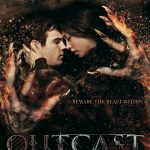Ratatouille (2007)

Pixar’s Ratatouille (2007), directed by Brad Bird, is a masterclass in animation and storytelling. With its whimsical blend of heart, humor, and culinary delight, the film stands as one of Pixar’s finest achievements. Featuring a unique protagonist—a rat with an extraordinary talent for cooking—Ratatouille defies expectations and delivers a powerful message about following one’s passion, embracing individuality, and breaking through societal boundaries.
Suggested videos for you:
Plot Overview
The story centers around Remy (voiced by Patton Oswalt), a rat with an extraordinary sense of taste and smell. Unlike the other rats in his colony, Remy dreams of becoming a renowned chef, inspired by his admiration for the late French chef Gusteau. When circumstances force Remy to leave his home, he ends up in Paris, where he finds himself in the kitchen of Gusteau’s restaurant.
There, Remy forms an unlikely partnership with Linguini (voiced by Lou Romano), a bumbling, unskilled garbage boy who is unknowingly tasked with cooking under the guidance of the hidden genius—Remy, who controls him by pulling on his hair. As Remy and Linguini navigate the challenges of the culinary world, they must also contend with the snooty critic Anton Ego (voiced by Peter O’Toole) and a competitive kitchen environment. The film’s central themes explore dreams, creativity, and the pursuit of excellence, all within the bustling, high-pressure world of French cuisine.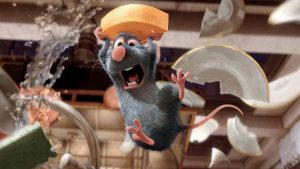
Themes and Emotional Resonance
At its heart, Ratatouille is about passion and the pursuit of one’s dreams, no matter how unlikely or unconventional those dreams might seem. Remy’s journey is a testament to the idea that talent and creativity can come from the most unexpected places. The film’s message that “Anyone can cook,” originally coined by Gusteau in the film, serves as a metaphor for breaking down barriers and challenging preconceived notions.
Additionally, Ratatouille explores the themes of self-acceptance and identity. Remy must reconcile his love for cooking with the societal expectation that rats are unworthy of such pursuits. The film encourages viewers to embrace who they are and follow their passions, even when the odds are stacked against them.
The relationship between Remy and Linguini provides a tender and humorous dynamic, representing the power of collaboration and the beauty of uniting different strengths. The film also examines the pressures of perfectionism, seen through the character of Anton Ego, the ruthless food critic whose view of success is challenged by Remy’s artful cooking.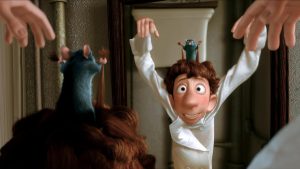
Characters and Performances
1.Remy (Patton Oswalt): Remy is one of Pixar’s most memorable characters—smart, ambitious, and empathetic. Oswalt’s voice performance perfectly captures Remy’s internal conflict between his rat instincts and his culinary aspirations. Remy’s determination to follow his dream against all odds makes him a deeply relatable and inspiring protagonist.
2.Linguini (Lou Romano): Linguini is a charming, awkward character who provides the film with much of its heart and humor. As a young man who stumbles into the world of cooking, Linguini’s growth mirrors Remy’s, and the two form an unlikely but genuine friendship.
3.Anton Ego (Peter O’Toole): Ego is a brilliant yet cynical food critic who represents the high expectations of the culinary world. O’Toole’s deep, commanding voice brings both gravitas and vulnerability to the character, especially in his emotional arc.
4.Colette (Janeane Garofalo): Colette, the only female chef in Gusteau’s kitchen, is both tough and inspiring, providing mentorship to Linguini while challenging him to improve. Her role adds a strong female presence in the film, balancing the male-driven dynamics.
The supporting characters, including the quirky kitchen staff and Remy’s rat family, provide additional humor and insight into the film’s message about the value of teamwork, collaboration, and individuality.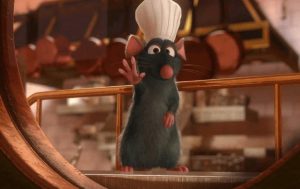
Animation and Visuals
Ratatouille is a visual feast, showcasing Pixar’s mastery in animation. The Parisian setting is brought to life with stunning detail, from the cobblestone streets to the bustling kitchen environments. The kitchen scenes are particularly impressive, with meticulous attention paid to the textures of food, the movements of the chefs, and the chaos of a high-end restaurant.
The animation of Remy’s interactions with Linguini is also expertly executed, with the rat’s subtle gestures and movements conveying emotion and character. The contrast between the grandeur of the restaurant and the tiny, quick movements of Remy adds a layer of whimsy to the film’s visual style.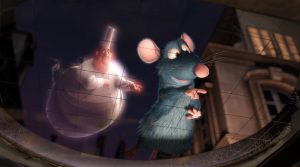
Music and Soundtrack
The film’s score, composed by Michael Giacchino, complements its elegant, lively atmosphere with a mix of French-inspired melodies and playful motifs. The soundtrack perfectly matches the film’s culinary theme, with themes of creativity, joy, and tension that underscore the emotional highs and lows of the story. The music adds an extra layer of richness to the viewing experience, heightening both the humor and the more heartfelt moments.
Criticisms
While Ratatouille is universally praised for its creativity, some viewers may find the pacing slow at times, particularly in the middle sections of the film. The concept of a rat becoming a chef may also feel a bit far-fetched, though this is part of the film’s charm and whimsical nature.
Additionally, the character of Anton Ego, though compelling, is somewhat predictable, and his arc could have been developed more subtly. While his transformation is impactful, it feels somewhat rushed in comparison to the rest of the story.
Legacy and Impact
Ratatouille was both a critical and commercial success, grossing over $620 million worldwide and winning the Academy Award for Best Animated Feature. It has since become a beloved classic, admired for its original story, memorable characters, and stunning animation.
The film has inspired numerous discussions on the role of creativity and individuality in a world that often values conformity. It remains one of Pixar’s most enduring films, demonstrating the studio’s ability to create thought-provoking stories that are both entertaining and emotionally resonant.
Conclusion
Ratatouille is a delightful and inspiring film that showcases Pixar’s storytelling brilliance. With its rich animation, unforgettable characters, and profound messages about passion, identity, and perseverance, the film remains a timeless classic. Whether you’re a fan of food, animation, or just a good story, Ratatouille offers a flavor-packed experience that leaves a lasting impression.




